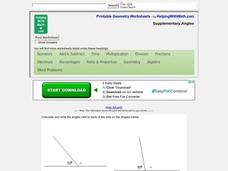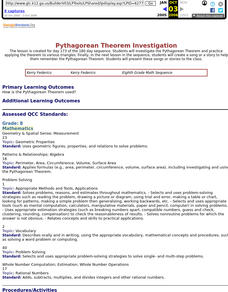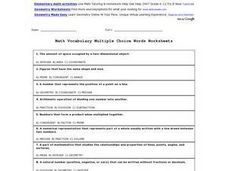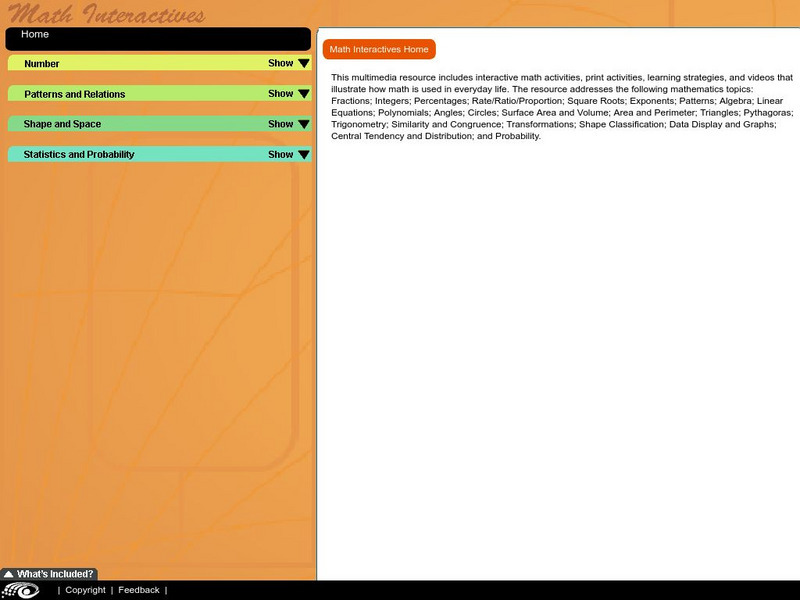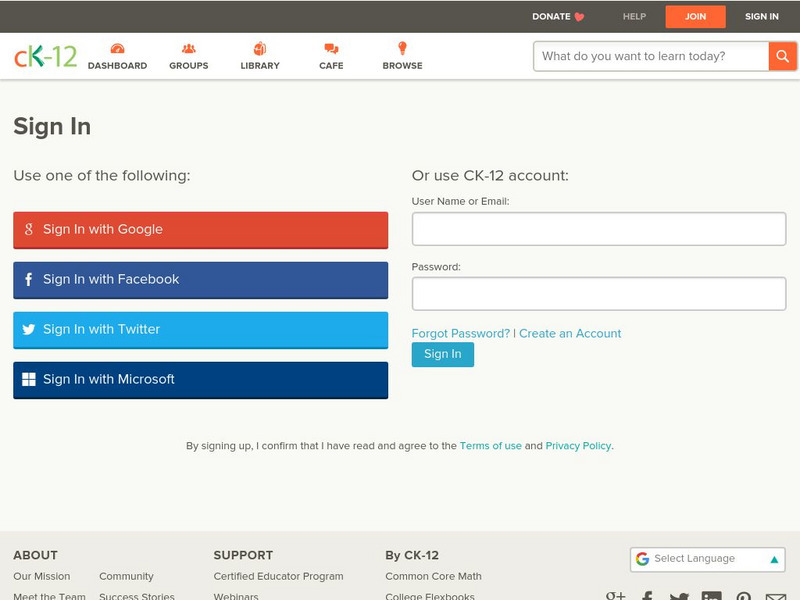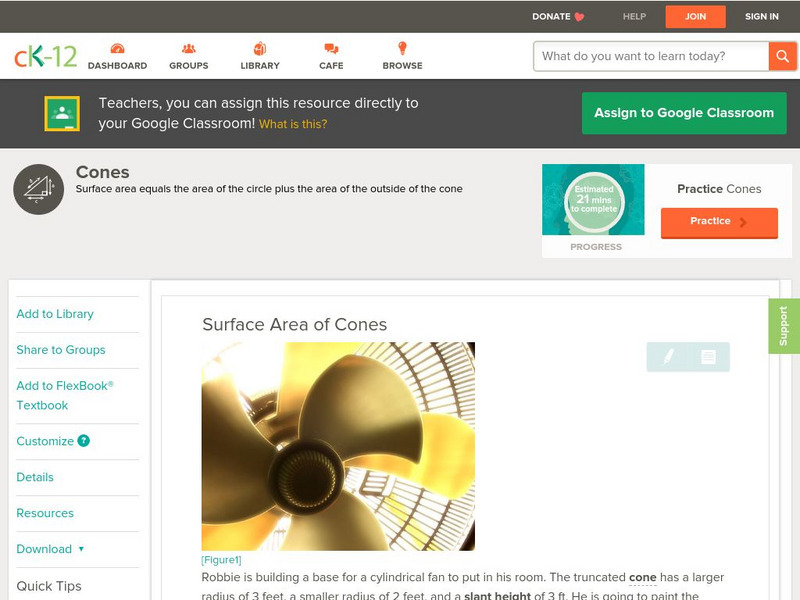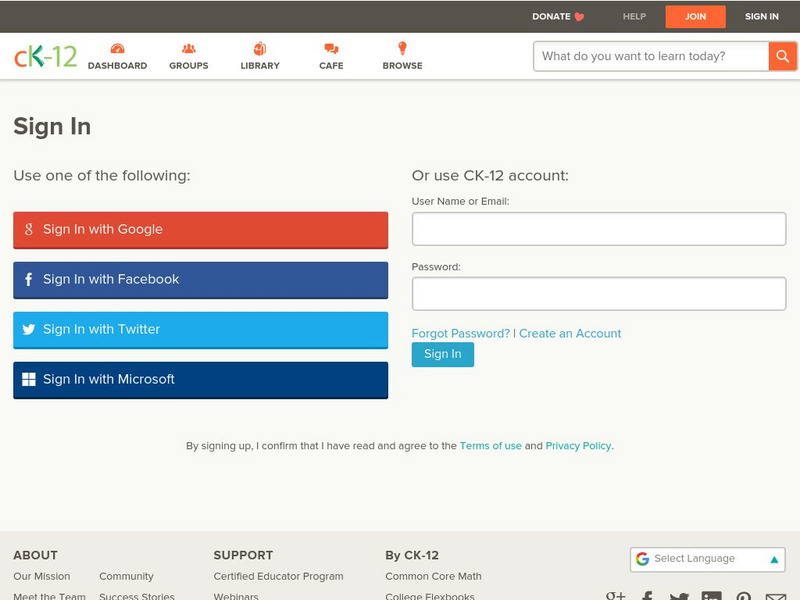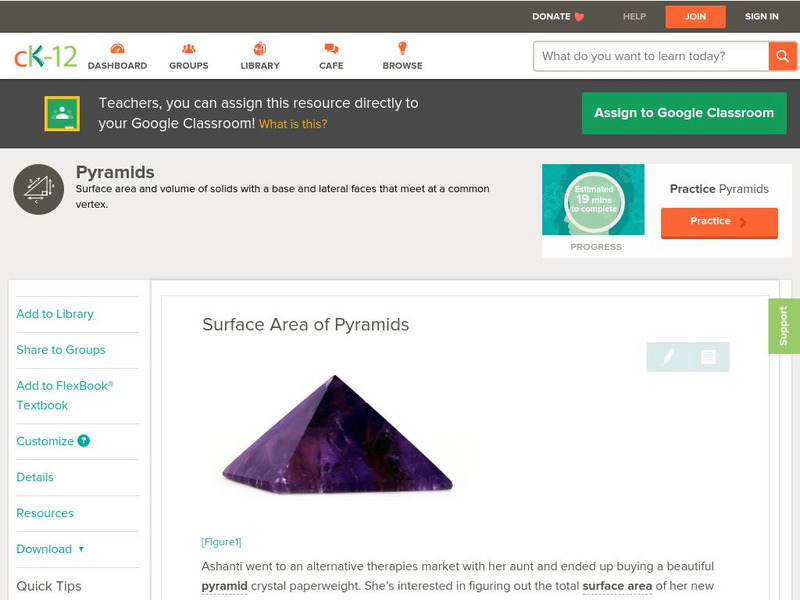Canton Museum of Art
Personal Clay Box
High schoolers will love this geometrically exact ceramics project; they create a personalized clay box using the slab method and mathematical measurements. They utilize scoring and square construction and can decorate the boxes to...
Helping with Math
Supplementary Angles
Pupils calculate the measurement of supplementary angles when one angle is known. The one-page assignment has six simple problems. It contains links to related resources as well as the answer key. Be aware that although the publisher...
Curated OER
Nature's Polyhedrons
Students are introduced to polyhedrons through using straw models to explore geometric solids and constructing Christmas tree ornaments using Epsom salt crystals. Students will view interactive videos and investigate and retrieve...
Helping with Math
Angles: Supplementary, Corresponding & Alternate (2 of 2)
In the second of two similar worksheets, anglers compute missing angles when given an alternate, supplementary, or complementary value. There are six problems to solve, but each of them requires two to four solutions. This is a nice...
Helping with Math
Angles: Supplementary, Corresponding & Alternate (1 of 2)
In the first of two similar worksheets, geometers compute two to four unknown angles when given an alternate, supplementary, or complementary value. There are six multliple-step problems to solve. This is a nice challenge for your...
Curated OER
Naming Geometric Shapes
Name that shape! This simple worksheet has learners identify each geometric figure. They examine rectangular prisms, cylinders, rectangular pyramids, and hexagonal prisms. This one-page worksheet contains 8 problems, and the goals seems...
Curated OER
Analyzing 3-D Shapes and 2-D Representations
Students can analyze 3-D objects better with actual physical models and by also drawing 2-D representations of them.
Curated OER
The Circle's Measure
Young scholars explore circumference and diameter. For this math lesson, students apply their knowledge of circumference and diameter to solve mathematical riddles. Young scholars apply this knowledge to find circumference and diameter...
Curated OER
Getting Familiar with Fractals
Students use the Internet to answer lab questions about fractals, and then construct fractals using the initial stage and iteration rule. They complete tables and generate rules for the "nth" term and create their own fractals.
Curated OER
Similar Triangles
Ninth graders find the height of every day objects using techniques learned through postulates that allow triangles in a problem to be similar. They calculate the length of a missing side and solve proportions.
Curated OER
Angles Lesson Plan
Students stud angles, and then play the "What's Your Angle?" game. They complete at least 10 computer generated problems from the Angles Applet.
Curated OER
Pythagorean Theorem Investigation
Eighth graders investigate the Pythagorean Theorem and practice applying the theorem to various triangles. Finally, in the next lesson in the sequence, 8th graders create a song or a story to help them remember the Pythagorean Theorem.
Curated OER
Math Vocabulary Multiple Choice Words Worksheet
For this math vocabulary worksheet, students complete multiple choice problems where they match the correct math vocabulary word to its definition. Students complete 15 questions.
Government of Alberta
Learn Alberta: Math Interactives: Exploring Surface Area, Volume, and Nets
Investigate the concepts of area, volume, 3D shapes, and nets using this interactive Learn Alberta math. The solid shapes focused on this exploration include rectangular and triangular prisms, rectangular and triangular pyramids,...
Annenberg Foundation
Annenberg Learner: Geometry: 3 D Shapes: Surface Area and Volume
Learn how to calculate the surface area and volume of rectangular prisms and cylinders. Four interactive animations, preceded by simple instructions, guide you through the process of calculating area and volume.
CK-12 Foundation
Ck 12: Geometry: Surface Area and Volume of Prisms
[Free Registration/Login may be required to access all resource tools.] This concept teaches students how to calculate the surface area and volume of prisms.
CK-12 Foundation
Ck 12: Geometry: Surface Area and Volume of Cones
[Free Registration/Login may be required to access all resource tools.] This concept teaches students to calculate the surface area and volume of a cone.
CK-12 Foundation
Ck 12: Geometry: Surface Area and Volume of Cylinders
[Free Registration/Login may be required to access all resource tools.] This concept teaches students to calculate the surface area and volume of cylinders.
CK-12 Foundation
Ck 12: Geometry: Surface Area and Volume of Cones
[Free Registration/Login may be required to access all resource tools.] Find the surface area of cones by using formuals
CK-12 Foundation
Ck 12: Geometry: Surface Area and Volume of Cones
[Free Registration/Login may be required to access all resource tools.] Use a formula and given information to find the surface area of cones and truncated cones.
CK-12 Foundation
Ck 12: Geometry: Surface Area and Volume of Pyramids
[Free Registration/Login may be required to access all resource tools.] Find the surface area of pyramids by using formulas
CK-12 Foundation
Ck 12: Geometry: Surface Area and Volume of Pyramids
[Free Registration/Login may be required to access all resource tools.] Use a formula and given information to find the surface area of pyramids.
CK-12 Foundation
Ck 12: Geometry: Surface Area and Volume of Pyramids
[Free Registration/Login may be required to access all resource tools.] Find a pyramid's volume and surface area.
CK-12 Foundation
Ck 12: Geometry: Surface Area and Volume of Pyramids
[Free Registration/Login may be required to access all resource tools.] This concept teaches students to calculate surface area and volume of pyramids.



